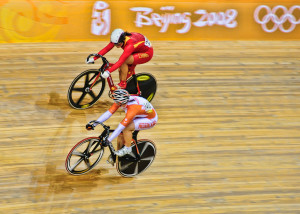medal, prize-medal [noun] [de medaille, de medailles] ![]()
 The word “medaille” is the topic of conversation on Dutch sport news these days, and probably not only in the Netherlands 🙂 Even though a small country, the Dutch participate in many sports at the Olympics, ranging from sailing to fencing. Sometimes we see Dutch sportsmen/women competing who we have never heard of!
The word “medaille” is the topic of conversation on Dutch sport news these days, and probably not only in the Netherlands 🙂 Even though a small country, the Dutch participate in many sports at the Olympics, ranging from sailing to fencing. Sometimes we see Dutch sportsmen/women competing who we have never heard of!
(Photo by Chris Coleman (flickr.com) – some rights reserved.)
The Dutch typically do well in hockey, swimming, rowing and judo where “we” expect some medals. We always have our hopes up for the Dutch volleyball teams, the cyclists and the gymnasts. So far the Netherlands is at the ninth place in the medal ranking (“medailleklassement”) with one gold (4x100m Freestyle Relay Women – last time was in 1936!), one silver (Judo Women -57 kg) and one bronze medal (Judo Men -60 kg).
These Olympics there is excitement for the Dutch gymnast Epke Zonderland, who is the first Dutch (male) gymnast to participate since 1928.
Although the word “medaille” is borrowed from French, the pronunciation will be Dutchified 🙂 However, the practical rule is to at least try to approach the French pronunciation. Some fail miserably at this and talk of a “mee-dal-ju” where the “dal” is emphasized more significantly.
A slang word for “medaille” is “plak” (“slice”), and you might hear a Dutch winner talk about his or her “gouden plak”.
Examples:
– “Nederland heeft tot nu toe drie medailles gewonnen.”
(“Up to now the Netherlands have won three medals.”)
– “Als topsporter doe ik alles voor een gouden medaille!”
(“Being a professional athlete/sportsman/sportswoman, I would do anything for a gold medal.” A “topsporter” literally translates to a “top sportsman”.)
– “Vertel ons eens, hoe voel je je, nu dat je geen medaille hebt behaald?”
(“Now that you have not won a medal, tell us, how do you feel?” The verb “behalen” can also be translated with “to obtain” or “to achieve”.)
– “Het winnen van een gouden medaille op de Olympische spelen was mijn droom. Nu is deze droom in duigen.”
(“Winning a gold medal at the Olympics was my dream. Now this dream is shattered. Note that “in duigen” is short for “in duigen gevallen”.)
Expression:
– “Elke medaille heeft een keerzijde”: every medal has two sides / its reverse.
Related words:
– Olympische spelen: Olympic games, Olympics.
– Medaillewinnaar: medallist [noun] [de winnaar, de winnaars]. Literally a “medal winner”.
– Medailleklassement: medal ranking [noun] [het klassement, de klassementen].
– Plak: slice. Slang for “medal” [noun] [de plak, de plakken].




